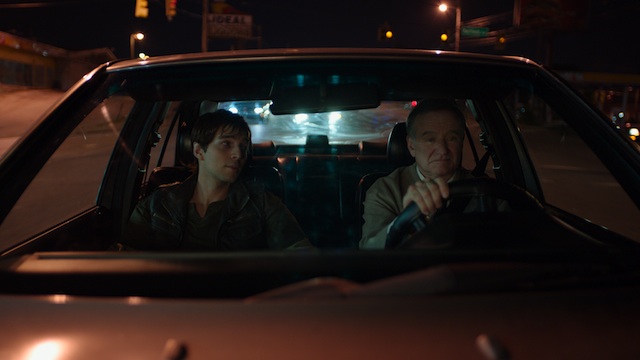‘Boulevard’ “Boulevard” has more than a serious and genuinely touching Robin Williams performance going for it, one that would have been effective even without his death lurking over it. Like the recent Blythe Danner vehicle “I’ll See You in My Dreams” it’s a Sundance-y movie that quietly subverts expectations and goes to some truly unique places. It also not so quietly conforms to other expectations, especially once it’s time to wrap things up. It’s a frustrating mixed bag of a film, but one that does more good than not. One of its more subtle strengths is partly accidental: it arrives in the wake of nationwide marriage equality, which only makes its specific subject more unique. Williams, in full-on sad-eyes mode, plays Nolan, a longtime banker who’s spent even longer in the closet, partly at risk of ruining his marriage of convenience to nice Joy (Kathy Baker). Today they would likely not be in the same predicament; instead they’re a relic from a happily bygone era. Bored, emotionally distant and tending to a dying father, he whimsically — and quite symbolically — turns off a street he’s driven down a million times, and he’s rewarded with Leo, a young street hustler (Roberto Aguire). The two wind up back at a motel, but this doesn’t become another tale of a tryst. It does, however, become another tale of someone helping out someone on the skids, and with a heaping helping of sexual tension. That Nolan’s intentions hover somewhere between charity and lust — even if they don’t bang, Nolan still likes to ogle him sans clothes — is a welcome, small twist on the normal. What fares even better is his home life. Joy could be the poor, jilted, long-suffering, killjoy wife. Instead, as written and played by Baker, she’s an intelligent woman whose marriage is, despite the lack of sexual sparks and the separate bedrooms, still a deep kind of love. The token scene around the end of the second act where the wife confronts her cheating husband instead becomes a hushed, patiently paced scene of them cradling each other on a bed, professing their deep affection amidst frank confessions. The script lazily orchestrates to have Joy head off to a conference just as Nolan and Leo’s relationship goes next level, but it never forgets her, and it always keeps in the back of the mind that if Nolan leaves for a new life then she’s left with nothing. It still resolves in an overly pat fashion — almost a parody of a sensitive coming out movie, as if the script has been gathering dust since 1991. Suddenly even Bob Odenkirk, as Nolan’s grouchy friend, is forced to say lines like, “Maybe it’s never too late to have the life you always wanted,” followed by sensitive montages set to some anonymous Nick Drake knockoffs. Director Dito Montiel tends to make grittier urban fare, like “A Guide to Recognizing Your Saints” and “Fighting.” He sometimes seems lost in suburbia, and his camera sometimes feels more stuck in place than Nolan. (When prowling the streets with Leo and his unsavory associates, you can sense the old Montiel returning.) Still, he has a real feeling for his characters’ emotions, and he coaxes a never more fragile turn from Williams, who when provoked seems so weak he might blow away like a pillar of dust. As the last live action film Williams made — there’s still a Simon Pegg film en route where he voices a dog, directed by Terry Jones — it’s a reminder that so few of his serious films truly took him seriously.
Director: Dito Montiel
Stars: Robin Williams, Kathy Baker
Rating: R
3 (out of 5) Globes
‘Boulevard’ is Robin Williams’ live action swan song

Starz Digital
Follow Matt Prigge on Twitter @mattprigge


















